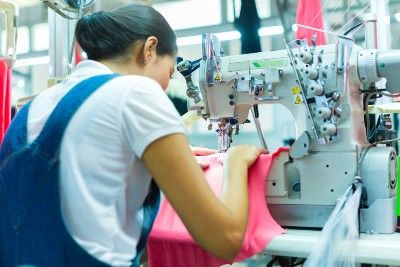
The British Retail Consortium has written a second letter to the U.K. government pleading for them to change the circumstances for Leicester garment workers, highlighting that they have lost £27 million in wages and are working in poor conditions, according to TheBusinessDesk.com.
In July, the British Retail Consortium (BRC) wrote a letter to the government urging that new regulations be made to fight unlawfully low garment worker wages. According to the trade body, the government needs to create a licensing scheme to help regulate Leicester garment workers’ pay and improve dangerous working conditions in some textile factories.
The BRC did not receive a response, according to TheBusinessDesk.com, so it wrote another letter in a second attempt at change for Leicester garment workers.
In the second letter sent to Home Secretary Priti Patel, the BRC wrote there has not been “significant action… to bring this injustice to an end,” the BBC reported.
“The BRC calculates that exploited workers in garment factories in Leicester alone are collectively being denied £2.1m a week in unpaid wages,” the second letter said, according to TheBusinessDesk.com. “This equates to over £27m since we raised this issue with you in July. This is entirely unacceptable.”
It became more apparent that conditions in for Leicester garment workers have not improved after the Boohoo scandal happened mere months ago. Conditions at Leicester textile factories allegedly were at fault for putting workers in danger of coronavirus infections.
Furthermore, Leicester garment workers have allegedly been told to come into the factory to work when they are sick or have already been fired, according a WSWS report. Many factories have upwards of 100 employees, and workers reportedly were made to continue working while their superiors knew they were COVID-19-positive or living with a COVID-19-infected person.
Throughout lockdown, Leicester garment workers continued working as normal, without precautions taken to protect their safety.
The Times launched an undercover investigation into the conditions of the Leciseter garment workers, WSWS reported. A Times reporter worked in a textile factory for two days and was told by another worker that he would be earning “between £3.50 and £4 an hour.”

If garment worker wages are £4, they are illegally earning less than half the national minimum wage.
Allegedly, the Leicester factory also did not provide masks or gloves or follow social distancing recommendations.
Sky News interviewed a Leicester garment worker named Ritu, who asked to keep her real name private to protect her from possible consequences.
She said she worked in a textile factory for six years. Ritu’s payslip officially says she makes £8.72 hourly, the national minimum wage, and works 42 hours weekly.
However, according to Ritu, these figures are far off and garment worker wages are much less because they are forced to work seven days a week, beyond 42 hours weekly.
“It’s 65 hours, 75 hours a week,” Ritu told Sky News. “No sick pay, no benefits, only work. I’m working for £5 an hour.”
When asked if she would seek work at another factory, she said no because every factory is paying £5 an hour.
When asked if she was scared of her supervisors, she responded: “Yes, of course.”
There are upward of 10,000 Leicester garment workers in hundreds of factories, and many could be just like Ritu.
The BBC reported the Home Office is making an effort to stop the exploitation of workers and illegally low garment worker wages.
“Exploiting vulnerable workers for commercial gain is despicable and we expect businesses to do all they can to tackle abuse and exploitation in their supply chains,” the Home Office said in a statement to the BBC.
“We are deeply concerned by the appalling reports of illegal and unsafe working conditions for garment workers in Leicester, and will ensure perpetrators face the full force of the law if evidence comes to light through the work of our new specialist Taskforce, led by the Gangmasters and Labour Abuse Authority,” the Home Office added.
Do you think the government end the exploitation of Leicester garment workers? Should factory bosses be held accountable for illegally low garment worker wages? Tell us how you feel in the comments section.
Check back daily for the most recent U.K. class action lawsuit and consumer protection news.
ATTORNEY ADVERTISING
Top Class Actions is a Proud Member of the American Bar Association
LEGAL INFORMATION IS NOT LEGAL ADVICE
Top Class Actions Legal Statement
©2008 – 2026 Top Class Actions® LLC
Various Trademarks held by their respective owners
This website is not intended for viewing or usage by European Union citizens.














